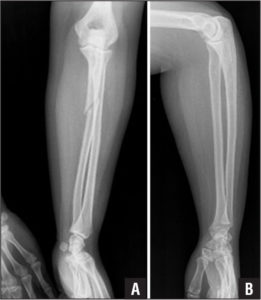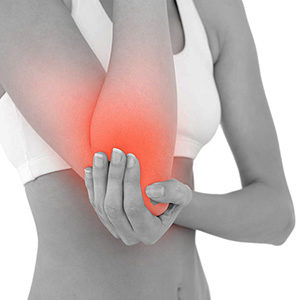Tennis is a physically demanding sport which, in avid players, is most often associated with hand and upper extremity overuse or repetitive stress conditions, such as tennis elbow and other tendinopathic injuries and conditions. But for those playing competitively with tennis leagues at tournament level play, there is also risk for more serious injury.
Nearly one-third of tennis injuries are the result of a traumatic or acute event, which include:
- Stress Fractures
- Muscle Strains
These types of injuries are most common in those players engaged in rigorous training, competitive play and frequent tournament participation.
Stress Fractures
Stress Fractures occur when repeated stress on a limb weakens the muscle. The overload of stress is then absorbed by the bone to the extent that a small fissure or fracture in the bone occurs. This often affects the olecranon (round bony part of the elbow) or the ulnar shaft and seen in athletes participating in throwing and swinging sports.
Additionally, young players are much more likely to sustain a stress fracture than professional playing adults, because they are training too rapidly and fatiguing the ill prepared muscles surrounding the bone.
Unlike a typical fracture that causes a clear break in the bone, a stress fracture is a slight crack that causes pain. While most often seen in the lower extremity in runners, they also occur in the upper extremity in competitive level athletes involved in such sports as tennis, swimming and throwing activities [1].
Stress Fracture Symptoms Include:
- Pain, weakness and or tenderness near the break
- Slight swelling
- Pain during activity, which is relieved at rest
Stress fractures are generally diagnosed with a physical examination and possibly an X-ray – though they can be difficult to see with this type of imaging. A bone scan or MRI may be indicated.
Treating Stress Fractures
Most stress fractures heal with adequate rest from the sport, physical therapy and modification of technique. If symptoms persist, arthroscopic surgery may be indicated to address bone spurs or remove loose bone fragments.
If a stress fracture is not treated despite increasing pain, it can become displaced, resulting in a more severe injury and predisposing the patient to the early onset of arthritis.
Muscle Strains
The rapid and sudden movements in tennis can result in muscle strain if players are not adequately warmed up and subjected to a rigorous training and play schedule. A muscle strain, also referred to as a repetitive strain injury (RSI) when seen in athletes and those involved in repetitive tasks, can cause tingling in the hand or arm, loss of sensation and loss of strength [2].
Other symptoms of muscle strain include:
- Tenderness in the affected muscle or joint
- Throbbing or pulsating in the affected area
A muscle strain is generally diagnosed with a physical examination, and treatment depends on the severity of the injury.
Muscle strain treatment may include:
- Anti-inflammatory medication
- Heat or cold therapy
- Splints
- Physical therapy
- Steroid injections (only when specifically indicated)
Preventing Injury
These types of traumatic injuries can be avoided with appropriate strength and endurance training gradually leading up to more rigorous training sessions. Proper warm up exercises and stretching are also key to avoiding injury, as with any sport.
In young, growing athletes committed to a single, competitive level sport such as many in tennis, it is particularly important to invest in technique and strength and endurance training, as well as ensure adequate rest for muscle recovery.
References
[1] Stress fractures of the upper limb. Sports Med. 1998 Dec;26(6):415-24.
[2] Repetitive strain injury (RSI) explained. Medical News Today. 2018 Jan (last updated). https://www.medicalnewstoday.com/articles/176443.php
This educational information was provided by Dr. Korsh Jafarnia, one of Houston’s renowned orthopedic surgeons and board-certified hand and upper extremity specialists. He is a member of the faculty at Houston Methodist Orthopedics & Sports Medicine, Houston Methodist Hospital – Memorial City/Spring Valley.
A Side Note:
An avid tennis player himself, Dr. Jafarnia had an opportunity to check out the Astros 2018 World Series Championship trophy while attending the River Oaks Tennis Club Men’s Clay Court Championship. (Pictured with Reid Ryan, President of the Houston Astros.)



Comments are closed.